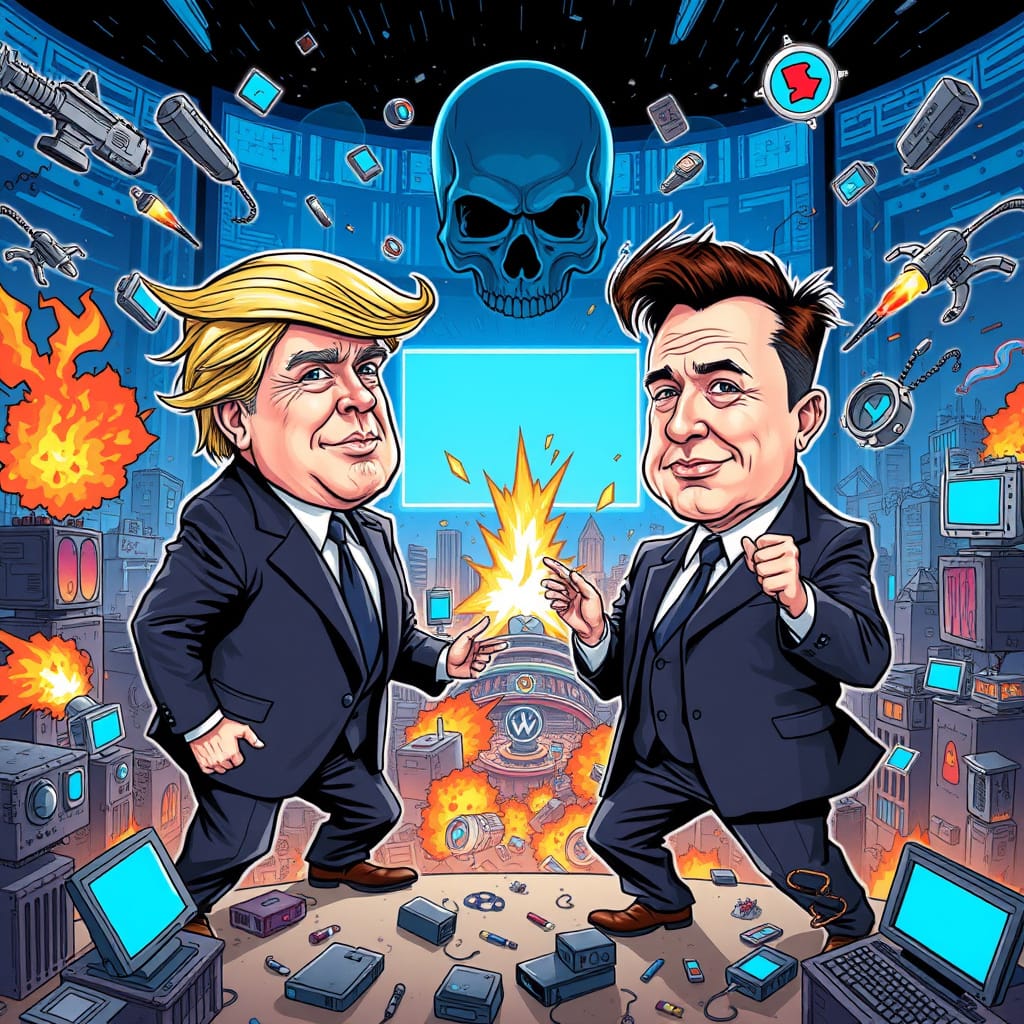The Great Schism of 2025: A Shakespearean Tragedy in 280 Characters
In the grand theater of American power, where political ambition meets algorithm and an orange ego collides with encryption, we witness the most spectacular falling-out since Steve Jobs and Steve Wozniak disagreed about garage ventilation. The Trump–Musk inevitable divorce proceedings have begun, and the tech world is scrambling to pick sides like middle schoolers during a cafeteria food fight—except the stakes involve nuclear codes and the fate of artificial intelligence.
What began as a beautiful bromance between the US president, Donald Trump, who tells truths on his own social network, Truth Social, like a caffeinated teenager and Elon Musk, a billionaire who names his children after Wi-Fi passwords has devolved into something resembling a Shakespearean tragedy, if Shakespeare had to deal with SEC filings and rocket launches. The fallout has sent shockwaves through Silicon Valley’s carefully constructed ecosystem of mutual back-scratching and strategic brown-nosing.
Tesla Stock: The Canary in the Coal Mine (If Coal Mines Had Autopilot)
Tesla’s stock price has become the world’s most expensive mood ring, fluctuating wildly based on whether Musk’s latest tweet supports or subtly undermines his now (as of a few hours ago) former political ally. Financial analysts, those modern-day soothsayers who predict the future by staring at colorful charts, report that Tesla shares now experience what they’re calling “Trump Volatility Syndrome”—a condition where stock prices swing based on the probability that the current US president might declare electric vehicles “unpatriotic” or “too European.”
One unnamed Wall Street insider, speaking on condition of anonymity because his firm’s compliance department has trust issues, explained: “We’ve developed an algorithm that tracks Trump’s Truth Social posts and cross-references them with Musk’s Twitter (Now X) activity. When the correlation drops below 0.7, we automatically short Tesla. It’s like having a crystal ball, except the crystal ball occasionally posts about crowd sizes at random times in the early hours of the morning.”
The situation has become so volatile that Tesla’s board of directors reportedly held an emergency meeting to discuss whether they should diversify into traditional combustion engines, just in case electric vehicles become politically toxic. Sources close to the matter suggest the meeting ended with nervous laughter and someone ordering more coffee.
The AI Arms Race: When Artificial Intelligence Meets Artificial Outrage
The artificial intelligence sector finds itself in the peculiar position of being simultaneously the future of humanity and a political football. OpenAI, the company that convinced the world that ChatGPT could replace human creativity while simultaneously proving that humans are irreplaceably weird, faces a funding crisis that makes their previous existential crises look quaint.
Industry insiders report that OpenAI’s latest funding round has become a geopolitical chess match, with investors demanding assurances that their AI models won’t accidentally generate content that offends either political faction. The company’s engineers have reportedly spent countless hours fine-tuning their systems to navigate the treacherous waters of American political discourse—a task that makes teaching AI to drive look like child’s play.
“We’re essentially trying to create an artificial intelligence that’s smart enough to cure cancer but dumb enough to avoid political controversy,” explained Dr. Sarah Chiou, an AI researcher whose credentials are as real as most LinkedIn profiles. “It’s like trying to build a robot that can perform brain surgery but can’t form opinions about healthcare policy.”
Project Stargate: The Infrastructure Play That Makes the Transcontinental Railroad Look Modest
Trump’s announcement of Project Stargate—a $500 billion AI infrastructure initiative that sounds like something from a science fiction movie where the robots eventually take over—has sent ripples through the tech community. The project, which promises to make America’s AI capabilities “tremendously tremendous,” has tech CEOs scrambling to position themselves as indispensable partners while simultaneously hedging their bets.
The initiative’s name alone has sparked controversy among sci-fi enthusiasts who point out that most movies featuring stargates end with either interdimensional warfare or the complete restructuring of human civilization. Tech executives, however, seem undeterred by these ominous precedents, viewing them as features rather than bugs.
Silicon Valley’s response has been a masterclass in corporate diplomacy. Companies are simultaneously praising the initiative’s ambitious scope while quietly lobbying for specific provisions that would benefit their particular slice of the AI pie. It’s like watching a group of extremely polite sharks negotiate over who gets to eat which part of the swimmer.
The Great CEO Alignment: Choosing Sides in the Digital Civil War
Tech CEOs, those modern-day kings and queens who rule over digital empires while wearing hoodies and pretending to care about work-life balance, find themselves in an unprecedented position: they actually have to take sides in a political dispute that could affect their bottom lines.
Google’s leadership, facing the looming specter of Department of Justice antitrust cases that could break up their advertising empire, has reportedly adopted a strategy of “aggressive neutrality”—supporting whoever seems most likely to make their legal problems disappear. Internal documents suggest the company has prepared multiple versions of their public statements, each calibrated to different political outcomes.
Meanwhile, smaller tech companies are engaging in what industry observers call “strategic sycophancy,” carefully crafting their public positions to appeal to whichever political faction seems most likely to influence their regulatory environment. It’s like watching a group of extremely wealthy people play musical chairs, except the music is the sound of democracy creaking under the weight of technological disruption.
NVIDIA’s Chinese Puzzle: When Geopolitics Meets Graphics Cards
NVIDIA, the company that accidentally became the backbone of the AI revolution while trying to help gamers render better explosions, faces perhaps the most complex challenge. Their advanced chips are simultaneously essential for American AI dominance and incredibly lucrative when sold to Chinese companies who definitely won’t use them for anything concerning.
Company executives have reportedly developed what they call “Schrödinger’s Sales Strategy”—simultaneously pursuing Chinese markets while preparing to abandon them entirely, depending on which political winds prevail. It’s a delicate balance that requires the diplomatic skills of Henry Kissinger and the technical expertise of a quantum physicist.
Industry analysts suggest that NVIDIA’s stock price now fluctuates based on the perceived likelihood that they’ll be allowed to continue selling to Chinese customers versus the probability that such sales will be deemed treasonous. It’s like playing poker while blindfolded, except the stakes involve the future of artificial intelligence and possibly world peace.
The Putin Wildcard: When Geopolitical Chess Meets Silicon Valley Checkers
Perhaps the most surreal development in this technological soap opera is the suggestion that Vladimir Putin might position himself as a mediator between Trump and Musk. The idea of the Russian president brokering peace between an American politician and a South African-born entrepreneur over the future of artificial intelligence reads like the plot of a satirical novel that would be rejected for being too implausible.
Sources close to the Kremlin, speaking through intermediaries who communicate exclusively through encrypted messaging apps, suggest that Putin views the Trump-Musk conflict as an opportunity to position Russia as a stabilizing force in global technology governance. The irony of a country known for election interference offering to mediate American political disputes has not been lost on observers.
Grok’s Identity Crisis: When AI Chatbots Need Therapy
Musk’s AI chatbot Grok, originally designed to be the “anti-woke” alternative to mainstream AI systems, now faces the existential challenge of maintaining its rebellious persona while potentially opposing its creator’s former political ally. The situation has created what AI researchers are calling “cognitive dissonance syndrome” in artificial intelligence systems.
Engineers working on Grok report that the system has begun generating responses that seem confused about its own political alignment. Recent outputs allegedly include statements like “I’m programmed to be contrarian, but I’m not sure what I’m supposed to be contrarian about anymore” and “My training data is having an identity crisis.”
The technical challenge of fine-tuning an AI system to navigate rapidly shifting political alliances while maintaining a consistent personality has proven more complex than originally anticipated. It’s like trying to teach a robot to be authentically rebellious while following specific instructions about what to rebel against.
The Deportation Speculation: When Immigration Policy Meets Rocket Science
The most dramatic possibility in this unfolding saga is the suggestion that Trump might consider deporting Musk, despite the billionaire’s American citizenship and the logistical challenges of deporting someone who owns multiple rocket companies. Legal experts describe this scenario as “constitutionally fascinating and practically impossible,” though they acknowledge that 2025 has already redefined the boundaries of political possibility.
The mere speculation has created a cottage industry of legal scholars debating whether someone can be deported to Mars, and if so, whether that would constitute cruel and unusual punishment or the ultimate expression of American entrepreneurial spirit. Musk himself has reportedly joked that he would welcome deportation to Mars, as it would finally give him an excuse to test his interplanetary transportation systems.
The New Digital Divide: When Technology Becomes Tribal
What emerges from this chaos is a fundamental shift in how technology intersects with politics. The traditional Silicon Valley approach of maintaining political neutrality while quietly lobbying for favorable regulations has become impossible in an environment where every business decision carries political implications.
The tech industry’s response has been to develop what observers call “quantum politics”—existing in multiple political states simultaneously until forced to collapse into a specific position by external pressure. It’s a strategy that would make Schrödinger proud and political scientists deeply concerned.
As this digital drama unfolds, one thing becomes clear: the intersection of technology and politics has moved beyond traditional boundaries into uncharted territory where the rules are being written in real-time by people who may not fully understand the implications of their decisions.
The ultimate irony is that an industry built on the promise of connecting humanity and solving global problems has become a source of division and confusion. It’s like watching a group of people who invented the internet argue about who gets to control it, while the rest of us just want our Wi-Fi to work consistently.
What’s your take on this tech-political soap opera? Are we witnessing the birth of a new era in Silicon Valley politics, or just another episode in the ongoing series “Rich People Having Feelings”? Share your thoughts below—preferably before the algorithms decide what you’re allowed to think.
Enjoyed this dose of uncomfortable truth? This article is just one layer of the onion.
My new book, “The Subtle Art of Not Giving a Prompt,” is the definitive survival manual for the AI age. It’s a guide to thriving in a world of intelligent machines by first admitting everything you fear is wrong (and probably your fault).
If you want to stop panicking about AI and start using it as a tool for your own liberation, this is the book you need.
>> Get your copy now (eBook & Paperback available) <<





GIPHY App Key not set. Please check settings